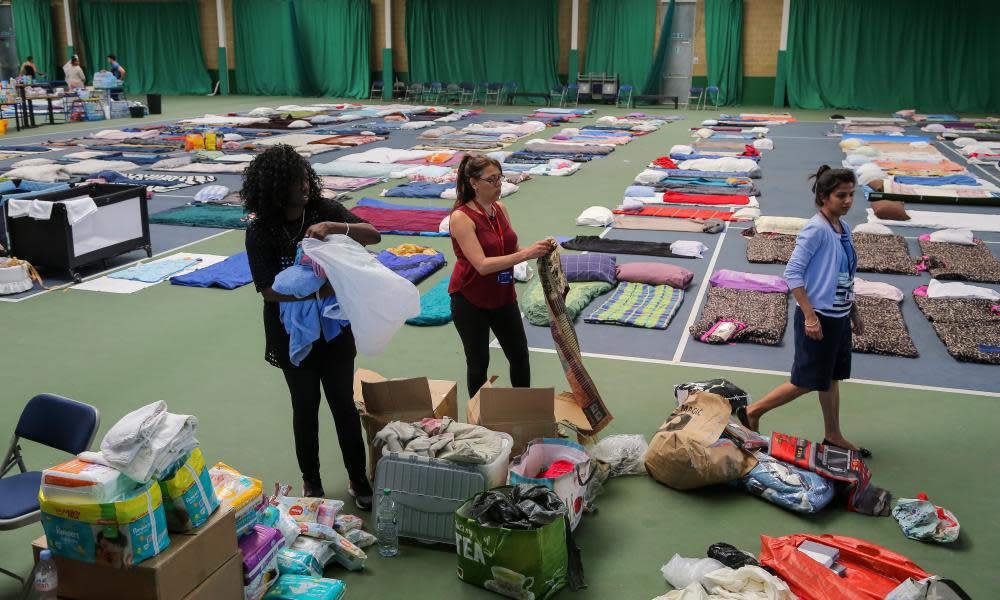Grenfell tenants 'not exempt from bedroom tax or benefit cap'

Former residents of Grenfell Tower will not be exempt from the bedroom tax and the benefit cap, the government has confirmed – although ministers have ordered that any tenants affected are prioritised for special payments to offset any losses.
Guidance from the Department for Work and Pensions (DWP) says councils should ensure Grenfell tenants hit by welfare reforms should be given so-called discretionary housing payments (DHPs) to protect them from potential housing benefit shortfalls of hundreds of pounds a month.
The government has promised that all Grenfell residents will be rehoused permanently as close as possible to their former home. This week it secured 68 social rented apartments in a new block in Kensington to provide permanent accommodation for those made homeless by the fire.
The guidance is the latest example of ministers moving to soften normal benefit rules for Grenfell residents. Earlier this week it said jobless tenants would not be sanctioned for failing to look for a job, and that a planned roll-out of universal credit in North Kensington next month would be put on hold.
A DWP spokeswoman said: “We have already relaxed benefit rules for anyone affected by the Grenfell Tower fire and our staff are handling people’s claims with sensitivity, understanding and flexibility.
“As part of this, our recent guidance to local authorities is that they should treat these residents as a priority for extra payments to help with their rent if they are rehoused in a larger property.”
We have already relaxed benefit rules for anyone affected by the Grenfell Tower fire
DWP spokeswoman
But experts said that providing DHP support was not always a permanent solution for tenants affected by welfare reform, especially if Grenfell tenants were allocated permanent homes that were too big and unaffordable under housing benefit rules.
Under the bedroom tax, residents in permanent social housing who are deemed to have more bedrooms than they require are docked housing benefit. In London, bedroom-taxed households typically have shortfalls of around £23 a week.
The benefit cap limits the total amount of benefits paid to out-of-work households to £442 a week in London. In Kensington and Chelsea, latest figures show that in February 421 residents were capped. The majority suffered a benefit shortfall of £100 a week, though in some cases it was as much as £400 a week.
Discretionary housing payments, as the name implies, are normally given out at the discretion of the council and there is no guarantee that tenants – usually those at risk of homelessness as a result of rent arrears caused by welfare reform – will receive a DHP payment. The DWP guidance suggests councils should relax the usual rules for Grenfell tenants.
Each local authority sets its own criteria to assess DHP claims, with claimants normally having to produce extensive details of bank accounts, savings and loans to justify why they should qualify for financial help to stay in their home. Kensington and Chelsea’s standard five-page form asks claimants to justify why they “need to live at this address in this particular area” and “Are there any reasons preventing you from moving to other accommodation or another area?”.
Although the guidance states that there is no limit to the length of time a DHP award may be made, permanent awards are rare, and are often restricted to a few months.
This week a judge criticised DHPs in a ruling that declared it was unlawful for single parents with children under two to be subject to the benefit cap. Mr Justice Collins said that DHPs were a temporary solution that gave “no peace of mind” to capped tenants and provided an “unsatisfactory safeguard” against homelessness.
He added: “For those such as the claimants who are living on the edge of, if not within, poverty the [DHP] system is simply not working with any degree of fairness.”

 Yahoo News
Yahoo News 
